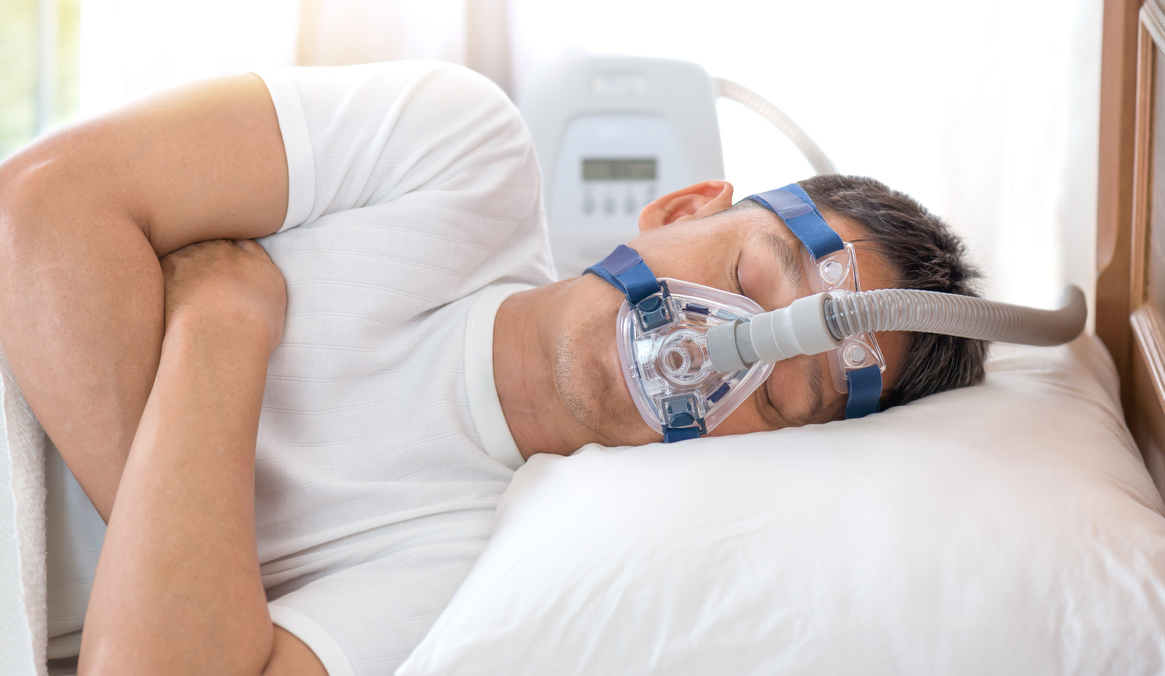What is obstructive sleep apnea?
Obstructive sleep apnea (OSA) is a condition where your breathing stops for short spells when you are asleep. The word apnea means ‘without breath’, that is, the breathing stops. In the case of OSA, the breathing stops because of an obstruction to the flow of air down your airway (tubes carrying air). The obstruction to the airflow occurs in the throat at the top of the airway.
You may also have episodes where your breathing becomes abnormally slow and shallow. This is called ‘hypopnea’.
What happens in people with obstructive sleep apnea?
When we sleep, the throat muscles relax and become floppy (like other muscles). In most people, this does not affect breathing. If you have OSA, the throat muscles become so relaxed and floppy during sleep that they cause a narrowing or even a complete blockage of the airway. If there is a complete blockage then the breathing actually stops (apnea) for around 10 seconds or more. The blood oxygen level then goes down and this is detected by the brain. Your brain cells awaken from sleep, send signals to the upper airway muscles which opens up the airway. This restores passage of air, oxygen levels improve but again, as you breathe during sleep there is narrowing of airway and subsequently obstruction. The same cycle repeats again and again throughout the duration of the sleep. Many patients are not aware of such events as they are asleep, some patients might experience disturbed sleep consistent with the brain cells awakening repeatedly during sleep. As a consequence, you will usually feel sleepy during the day. Daytime sleepiness in someone who is a loud snorer at night is the classic hallmark of someone who has OSA.
Occasionally, if someone watches you during sleep, he or she will notice that you stop breathing for few seconds, and then make a loud snore and a snort, perhaps even sound as if you are briefly choking, briefly wake up, and then get straight back off to sleep.
Sleep study is the test performed to diagnose obstructive sleep apnea. For the diagnosis of OSA you need to have at least five episodes of apnea, hypopnea, or both events per hour of sleep. Severity of OSA is graded as follows-
- Mild OSA – between 5-14 episodes an hour.
- Moderate OSA – between 15-30 episodes an hour.
- Severe OSA – more than 30 episodes an hour.
Who gets obstructive sleep apnea?
OSA can occur at any age, including in children. However, it is common in middle aged men who are overweight or obese. It is thought that as many as 4 in 100 middle aged men and 2 in 100 middle aged women develop OSA.
Factors that increase the risk of developing OSA, or can make it worse, include the following.
- Overweight and obesity. Particularly if you have a thick neck as the extra fat in the neck can squash the airway.
- Drinking alcohol in the evening. Alcohol relaxes muscles more than usual and makes the brain less responsive to an apnea episode. This may lead to more severe apnea episodes in people who may otherwise have mild OSA.
- Enlarged tonsils.
- Smoking.
- Taking sedative drugs such as sleeping tablets or tranquilisers.
- Sleeping on your back rather than on your side.
- Having a small or receding lower jaw (a jaw that is set back further than normal).
What is snoring? Is it different from Obstructive sleep apnea?
Snoring is described as the loud noise a person makes during sleep due to air flowing through a narrow airway passage. The vibration of the muscles in the upper airway makes the sound which is said to be loud if it disturbs the sleeping partner or is heard outside the room. Snoring is a disorder which is seen in majority of individuals including children to a variable extent and may not be every night. But, if there consistent snoring sleep and if it is loud then, it is worth getting examined by a doctor to identify the cause and when required a sleep study is performed. Snoring is the starting point for many who eventually develop obstructive sleep apnea. It is often difficult to make out when this happens but if you have risk factors, your snoring is loud and even if you have any one of the symptoms of OSA then you should consult the doctor. Not all who have snoring may have OSA but almost all who have OSA are snorers.
What are the symptoms of obstructive sleep apnea?
People with OSA may not be aware that they have this problem as they do not usually remember the waking times at night. It is often a sleeping partner or a parent of a child with OSA that is concerned about the loud snoring and the recurring episodes of apnea that they notice.
One or more of the following also commonly occur:
- Daytime sleepiness. This is often different to just being ‘tired’. People with severe OSA may fall asleep during the day with serious consequences. For example, while watching T.V, reading newspaper or as a co-passenger in a car. A particular concern is the increased frequency of car crashes involving drivers with OSA.
- Poor concentration and mental functioning during the day. This can lead to problems at work.
- Not feeling refreshed on waking
- Morning headaches.
- Depression
- Being irritable or restless during the day.
- Other symptoms include dryness of mouth in the morning after awakening, waking up frequently in the night to pass urine and feeling tired all the time.
How is OSA diagnosed?
Your Doctor will ask for a sleep study which detects changes during sleep to confirm sleep apnea. This test is preferably done in your house where you may be comfortable sleeping naturally. Sleep study can be full study (polysomnography) or limited study. Usually, limited study is sufficient to make a diagnosis, when in doubt full study is advisable. You will be asked to meet the doctor after the result of the test is available to discuss the findings. Sleep study will also determine the severity of the problem and accordingly your doctor will discuss the treatment plan with you.
What are the consequences of untreated OSA?
Many times patients are not aware of the problems as they are sleeping. It is only when someone notices the apnea episodes (breathe stopping) during sleep or there are choking episodes during sleep or excessive sleepiness during daytime, that, suspicion of OSA arises. Many times a doctor who specializes in sleep disorders or a physician visit for other reasons might make the doctor suspect the condition. In our country the diagnosis is often delayed and patients would have already developed problems like a heart attack or brain stroke or poorly controlled diabetes or new onset diabetes. Patients can have problems of heart rhythm disturbances, poorly controlled blood pressure, memory problems, impotence, poor performance at work and depression.
Making a diagnosis of OSA early and taking appropriate treatment can avoid all such consequences and restore a healthy state of both body and mind. Sleep which is good in quality and duration can have lasting impact on overall health of an individual.
What is the treatment for OSA?
General measures: losing weight, not drinking alcohol, not using sedative drugs, stopping smoking, sleeping on your side or in a semi-propped position.
Continuous positive airway pressure (CPAP) – This is the most effective treatment for moderate or severe OSA. This treatment involves wearing a mask when you sleep. A quiet electrical pump is connected to the mask to pump room air into your nose or both mouth/nose at a slight pressure which helps keep the throat open when you are breathing at night and so prevents the blockage of airflow. The improvement with this treatment is often very good, if not dramatic.
Once patients start using CPAP they notice quality sleep and there is an improvement in daytime wellbeing as daytime sleepiness improves the next day. Snoring is also reduced or stopped. The device may be cumbersome to wear at night, but the benefits are usually well worth it. Comments like “I haven’t slept as well for years” have been reported from some people after starting treatment.
Other options- mandibular devices (jaw positioning) and surgery.
It is important to consult a doctor who has experience in managing OSA and follow appropriate treatment options. Loud snoring should prompt an assessment to fix the problem early and also rule out OSA.



